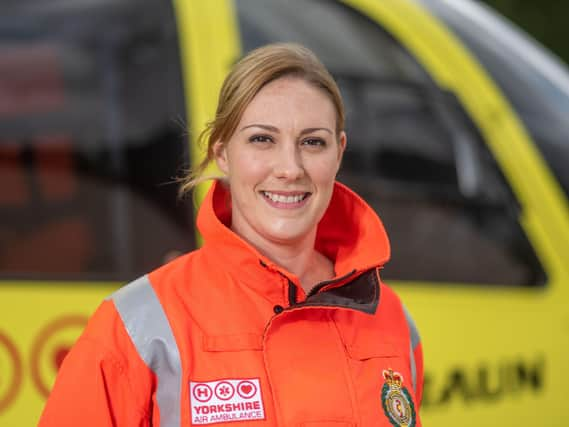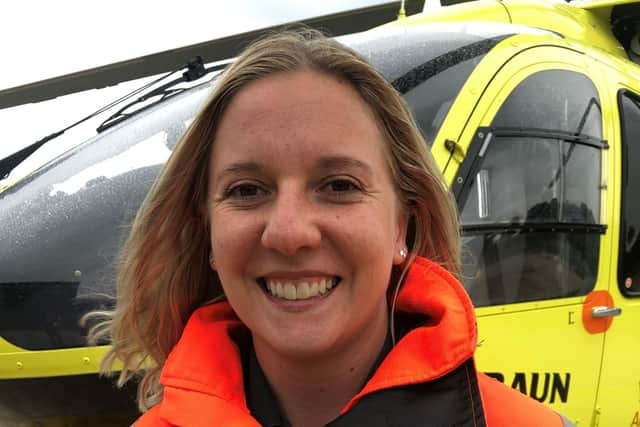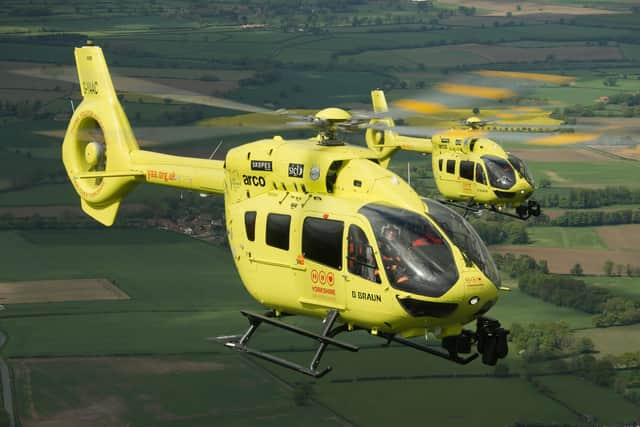The Yorkshire women putting their lives on the line


Paramedics Rachel Smith, Georgina Godfrey and Gemma Richmond form part of the Yorkshire Air Ambulance (YAA) Critical Care Team.
Here they share their experience over the last year.
What has it been like working through the pandemic?


Rachel: My job role changed vastly working through the pandemic. We had to think a lot more about personal protective equipment (PPE) and it always has to be at the forefront of our minds to protect ourselves and our patients.
Advertisement
Hide AdAdvertisement
Hide AdWe also had to consider protecting our families, as we go home every night to our loved ones and we don’t want to run the risk of passing Covid on to them.
Georgina: I started working for YAA around August time as we were just coming out of the first lockdown and everything was looking positive. I had a new job and we had just completed four weeks of training and then another lockdown was announced.
It was a worrying time as none of us knew when lockdown would end and the vaccines wasn’t quite ready at that point. There’s more of a light at the end of the tunnel now.


Gemma: You have all the complications that come with a new job such as training and how you’re going to fit in with your new role and then, on top of all that, you have extra work involved ensuring that you’re safe and that the patient is safe and all of the relatives are safe.
Advertisement
Hide AdAdvertisement
Hide AdThere’s a lot to remember and a lot to take on, it’s a constant extra pressure. It makes decision-making more difficult and also patient relations harder as there’s a barrier in the way in form of PPE. You never really consider how much facial expressions matter until your face is covered and the patients can’t see you.
What was has it been like wearing PPE?
Georgina: There’s a lot of PPE to wear, especially when it is hot outside, it can be difficult to wear. You sweat quite a lot in it and we had a particularly hot summer. If you were in it for too long, it could make you feel a bit ill. Then when we went into winter, we had trouble wearing the goggles steaming up.
We’ve had a few hiccups, but on the whole, it has become part of the new normal. Because we have worn it for so long, your body gets used to it. We have to remind ourselves that it’s there to protect us and the patients.
Gemma: It’s very, very hot. Even in winter, it’s hot as you’re wrapped up, especially at Topcliffe as a lot of the jobs are outside. I’m often wearing a base layer, YAA T-shirt, gilet and jacket and then my flight suit on top of that and the PPE such as an apron or grown. You end up cooking!
Advertisement
Hide AdAdvertisement
Hide AdRachel: It’s not very pleasant as it can be very warm, but it’s vital to protect ourselves, our patients and our loved ones.
How does it feel like to be working on the frontline?
Georgina: In the very first lockdown I was on the road in the ambulance and people would stop and applaud us. People would pull over and thank us for all the fantastic work we have been doing and for putting our lives on the line. It becomes quite emotional. You go to work and you don’t expect gratitude and thanks. It was heartwarming to see all community coming together. I’m so proud to be working on the frontline.
Gemma: I think people are appreciative of people who have continued to work through the pandemic because a lot of the country was furloughed or worked from home.
We never saw that side of the pandemic because it was never an option for us. Patients would still be poorly and the medical world wasn’t going to stop. I was proud to be out there and doing my role even though I was putting myself at risk.
Advertisement
Hide AdAdvertisement
Hide AdRachel: You know that you’re going to work and being potentially affected by Covid, but you also know there are people out there that will need you. I think people appreciate more what we put ourselves through to look after others.
How does it feel to be a female paramedic in 2021?
Georgina: I started working for the ambulance service in 2010 and I’ve seen a change where more women are working in the ambulance service, especially in more management roles. I think that Yorkshire Air Ambulance and Yorkshire Ambulance Service do a fantastic job of empowering females, giving us lots of opportunities and helping put things forward – which is great.
Rachel: There are a lot more women in the service since I started working as a paramedic 14 years ago; there weren’t that many women working for the ambulance service back then. I think the interpretation of what a paramedic is has changed. It’s not so much about the physical aspects of the role such as dealing with a road traffic collision any more, the caring element is a lot more prevalent.
Gemma: I think in the past it was probably looked at as a male-orientated role or thought of. I’ve been in the service for 19 years now and it’s now a lot more 50:50, especially on the road. I think it appeals to more females now because they bring something different especially if you get a male and female crew in the aircraft – you tick every box, you can deal with so many different cases.
It’s nicely spread out and good teamwork when you get that mix. I work as a double female crew quite often and I think people still expect to see a man jump out of a helicopter.
Comment Guidelines
National World encourages reader discussion on our stories. User feedback, insights and back-and-forth exchanges add a rich layer of context to reporting. Please review our Community Guidelines before commenting.